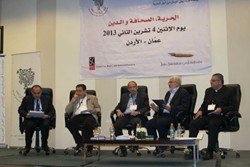Image:

13 Nov 2013
The Jordan Media Institute (JMI) and the Royal Institute for Inter-Faith Studies (RIIFS) organized a conference entitled “Freedom, Media and Religion,” in cooperation with the Friedrich Naumann Foundation for Liberty and SKeyes Center for Media and Cultural Freedom.<br />
<br />
The conference, which was attended by 150 experts and journalists, discussed a number of topics including the impact of the religious-secular conundrum on the freedom of the press; religion and freedom of expression; managing pluralistic societies and humor & religion in the media.<br />
<br />
“Religion is an effective element in all societies, including those that define themselves as secular and non-religious,” H.E. Professor Kamel Abu Jaber, Director of RIIFS, said during the opening ceremony. “It is an essential component –despite attempts to deny this – that shapes the identity of humans and societies,” he added.<br />
<br />
Abu Jaber noted that the purpose of linking humor to religion was not in any way an attempt to undervalue the role of religion and its effects on our lives, but to emphasize the humane side of religion, highlighting the importance of religion as a tool that helps people endure the burdens of life, and fortifies them with ethics and morals. “But this does not mean a person should stay grim in his or her actions and relations,” he added.<br />
<br />
Dr. Basim Tweissi, Dean of JMI, said it was important to highlight three facts: the first was that culture was more important than politics and economy, and the importance of restoring significance to the unity of Arab culture. The second was the big role the subtle power of countries and societies played through media, while the third discussed the political extremism that stirred stagnant religious feelings, and transformed some media outlets into tools in the hands of extremists and religious groups.<br />
<br />
Dr. Tweissi insisted on the need for greater efforts to promote diversification in the Arab media, which, he said, required enhancing the coverage of religion related issues, and putting an end to hate speech. This, he elaborated, necessitated developing professional skills to ensure more freedom, and less use of religion for political purposes in the media.<br />
<br />
Mr. Ralf Erbel, the representative of Friedrich Naumann Foundation for Liberty in Amman, said that the reason for turbulence in Arab societies was not a lack of trust between citizens and regimes, but a lack of trust among citizens themselves, noting the three topics addressed by the conference: the relationship between religion, secularism and the state; the media that largely failed to provide a platform for dialogue & communication and freedom. He added that without freedom of expression, it was not possible to create and nurture a pluralistic society.<br />
<br />
Mr. Ayman Mhanna, Executive Director of SKeyes Center for Media and Cultural Freedom, said that media completely lacked freedom of expression in some countries, while this freedom was protected by law in others, which still faced hidden pressures from state instruments. It was, therefore, important to neutralize the influence of military and religious institutions on investigative journalism.



